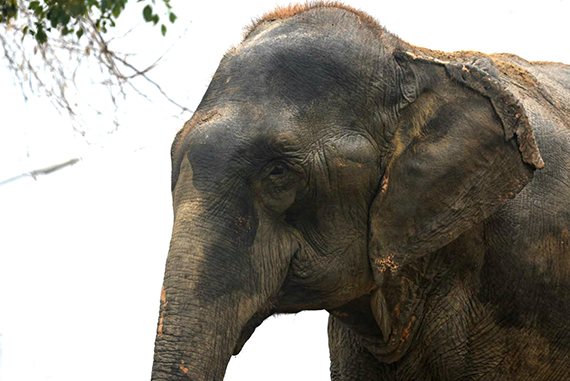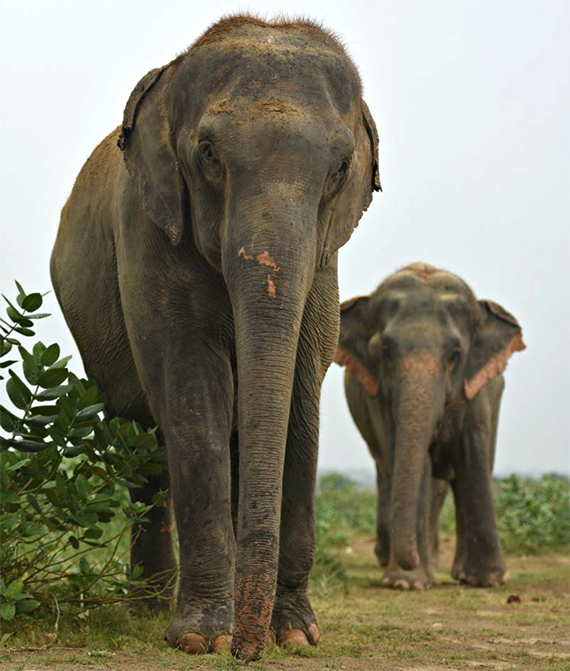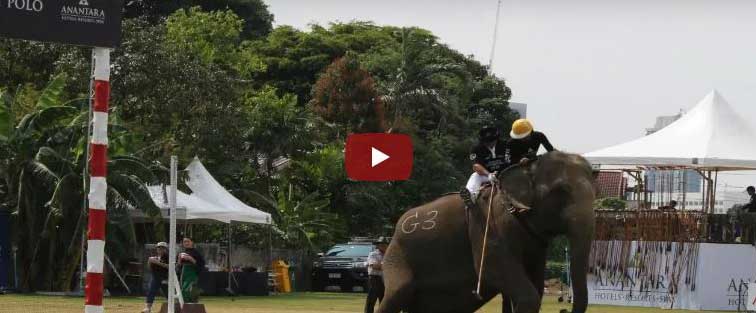Lakhi, Trump's Trophy Hunting Plan, Brian Franzen uses Bullhook at Shrine Circus, Molly, Thailand's King's Cup Elephant Polo Tournament, Japan has most ivory wholesalers, manufacturers, and retailers in the world, Elephant In The Room

Urgent update: Trump just announced that the Fish and Wildlife Service will now allow "trophy" imports of dead elephants and lions on a "case-by-case" basis. This is completely unacceptable. Please sign and share to protect animals and keep the total ban on this cruelty!
President Trump just opened the door to expanded sport hunting of some of the world's most beloved — and imperiled — animals: Africa's elephants and lions. We need your signature today to help stop him.
Near the turn of the 20th century, Africa was home to between three and five million elephants. Now less than half a million remain. Africa's lions have seen similar declines, with lion numbers declining by 42 percent in just the last 20 years.
To save these iconic animals from extinction, the Obama administration banned the importation of elephant trophies from Zambia and Zimbabwe and made importing lion pelts and other trophies more difficult.
Now President Trump — whose sons have boasted publicly of killing rare animals in Africa — has reversed this animal-saving ban.
This reversal will almost inevitably increase poaching of these rare animals. According to Jeffrey Flocken of the International Fund for Animal Welfare:
"When a species' greatest value is as a dead trophy, its days will inevitably be numbered, just as they are when the value of their parts — like ivory tusks, tiger skins, or rhino horn — make protection from poachers nearly impossible."
The move is also squarely at odds with public opinion in the US. 82% of Americans surveyed support banning lion trophies, and 83% support banning elephant trophies.
That's why Care2 is calling on Arizona Congressman Raul Grijalva, one of the most stalwart animal defenders in Congress, to introduce legislation to reverse the Trump administration's trophy import decision as soon as possible.
By adding your name today you'll show Congressman Grijalva that conservation-minded people around the world reject sport hunting of our imperiled species. And you'll provide the public support we'll need to restore vital protections for whales and lions.
| ||||||
| ||||||
| ||||||
| ||||||
| ||||||
| ||||||
Molly’s new herd is helping so much. We’re doing everything we can to save Molly. Luckily, we have some help. The other orphans have taken Molly under their wing and are comforting and guiding her.
Molly is a sweet young calf from Zimbabwe whose mother was shot right in front of her. The trauma of that could have killed her – but her gentle spirit survived. Yet that was just the beginning of her problems.
Dehydration, life-threatening intestinal problems, and kidney failure all plagued this grieving orphan when we found her... we had to act fast!
Molly was flown to Zimbabwe Elephant Nursery (aka ZEN) where our staff immediately went to work saving her life.
Those early days were heartbreaking – as she paced in small circles – trying to cope with the trauma she had just suffered through.
You can help provide the IV fluids she needs, the special formula she is fed, and the care that her Keepers provide for her around-the-clock – even sleeping next to her to provide the companionship she needs.
Elephants suffer so much cruelty. We believe that every elephant matters – and every elephant deserves to live naturally and in peace.
Several days ago we lost our dear, dear elephant friend, Lakhi. We cannot express the heaviness of our hearts this week. But we want to celebrate and remember Lakhi’s life, and perhaps the best person to do that is our Elephant Campaign Manager, Rhea Lopez. She was one of many people who knew and loved Lakhi, and was lucky enough to spend time with her regularly. These are her words.
In February 2015 when Lakhi arrived at the Elephant Conservation and Care Centre, she was more than 60 years old, a blind, former–begging elephant rescued from the streets of the city of Pune. She seemed timid and nervous — blindness is an added burden for captive elephants that can never really tell where the next blow will come from. The touch of human hands caused her to recoil fearfully, too scared to even investigate new smells or people. Then Lakhi met Asha.
“I’ve never seen two elephants get along so spontaneously,” her mahout Babulal recalls. “They were complete strangers, but from the first day itself, they knew — and we knew — this friendship was going to be something unlike any we’d ever seen before.”

With Lakhi under her care, Asha blossomed into the matriarchal role she seemed destined for, standing protectively over Lakhi when she lay down to rest, and using an astonishing array of sound cues to call her and comfort her.
We called Lakhi “the Banana Thief” because she made her adoration for the fruit obvious from the day we first met her, sneaking her trunk out toward the smell and gingerly plucking her favourite treats from the bundle and swiftly putting them in her mouth. Her keeper was always happy to oblige, and would call out to her when he approached with a bunch of bananas, breaking them off as he fed her each piece and talked quietly to her. Between her keeper and Asha, Lakhi’s world came alive through conversations, in human voices and elephant rumbles, and through the myriad of new smells and sensations she experienced over her time at the Care Centre. She discovered the soothing effect of cool water against her skin and the weightlessness of being in the water, the delightful roughness of tree bark against itchy skin, the warm sun on her back, and the coziness of her winter blankets when the temperature dipped. Slowly she learned what kinder hands felt like, allowing her keepers and the vets to run their palms along her trunk as they spoke to her, or guide her gently as they went on long walks. But I think the sensation that gave her the most joy was always that of Asha’s trunk running along her face, touching her lightly out on walks just to reassure Lakhi that she was there and keeping a watchful eye on her.
When Coco came, Lakhi’s world grew even brighter. Timid and fearful little Coco had been deprived a mother for her entire life, but Lakhi stepped into the role with absolute ease. She never hesitated to seek Coco out when the younger elephant cried, or to stay close by her side out on walks, occasionally enveloping the smaller elephant with her trunk in a safe embrace. As if taking a cue from Asha, Lakhi made sure that Coco always felt safe and loved, and stood protectively over her whenever she lay down for a nap.
Lakhi was an incredible elephant — she was already tall but she held her head up high, which added to the effect. Despite her gaunt frame, she seemed to take over the space she was in with an aura that engulfed you and instantly put you at ease. She was calm, and enjoyed her walks and baths so much that it was incredibly easy to work with her. New mahouts that joined Wildlife SOS would always start off working with her and the herd, so in a way, she initiated everyone into their lives at the Care Centre. She was the starting point to all of their journeys here, touching each and easing us in.
The thing about caring for older elephants is that it is that much harder to treat them; their bodies have been ravaged by cruelty for decades, and they just don’t heal as easily. And somewhere deep inside, you know you don’t have as much time to heal them fully, and need to focus on making sure the few years they have left are the most incredible, peaceful ones they could ever dream of.
With time, Lakhi’s age caught up with her, and she showed signs of slowing down; old injuries got inflamed, and she seemed to prefer resting against the mud beds in her enclosure. Late Saturday evening on the 3rd of March, she seemed more weary than usual, and even as her knees buckled under her, Asha and Coco rushed to her side to support her. Asha appeared calm and strong, as if she knew in her own way that this was it — Coco panicked initially, rushing about and running circles around her fallen friend. The team rushed in and the crane was called in to lift Lakhi back to her feet and support her. The elephants moved aside and watched, Asha touching them gently as they huddled together. They stood back as the team tried to get Lakhi to her feet, and even the younger elephants seemed uncharacteristically calm. Maybe they knew, maybe they realised it was time to let go and had their chance to say their goodbyes, and wanted to let her pass in peace. Lakhi resisted being lifted, as if she too knew her time had come. She let out her final breath and slumped down against the mud bed, eyes shut, looking completely at peace. As the team moved away, heartbroken, Asha rumbled loudly from where she was standing, but none of the elephants moved. Coco let out a small wail, and from every enclosure elephants responded softly with rumbles, trumpets, and huffs — all the way from the bulls to the closer-by females like Phoolkali — in what seemed like an orchestra of calm, reassuring solidarity for their fallen friend.

Lakhi’s burial was simple but poignant. Her keepers adorned her with flowers and lit incense and earthen lamps around her, each taking a moment to touch her one last time, paying their respects through silent prayers and whispered words. Her burial stood testament to how many lives she had touched during her three years at the Rescue Centre. So many journeys had started with this wonderful elephant, and now her journey had come to an end, leaving a huge gap in all our lives.
Lakhi’s post-mortem report revealed her cause of death to be organ deterioration and joint degradation due to her advanced age and her 60 years in captivity. These are things we could never have completely undone, and although her passing was sudden, it must have been time for her gentle soul to leave the tortured body that had housed it all those years.
Lakhi leaves behind broken hearts around the world, starting here. Asha refused to eat the entire day, refused to budge from the spot on which she last lay. She’s been listless and mournful, albeit quiet — running her trunk through the mud and letting out the most heartbreaking guttural rumbling sounds every few minutes. Every so often, Coco, Peanut, or Suzy will respond to her. Once in a while another elephant will rumble back. Asha’s keeper stands beside her, talking to her and trying in his own way to comfort her. He hand-fed her a bucket of greens last night, which she ate slowly and sadly. He talks to her awhile about Lakhi — about how beautiful and calm she was, how incredible their friendship was, and how much he misses her too. He tried calling her into the shade, but Asha remained rooted to spot her friend had passed.
In the evening an incredible storm hit the centre with strong gusts of wind and pouring rain — completely uncharacteristic of this time of the year. Someone said that Lakhi sent the rain to us and all the elephants for a little respite from the incoming summer, to settle the dust and clean the air. The weather is cooler today, and Asha and the other elephants seem calmer, though Asha still lets out the intermittent sigh or rumble.
It will take time for the sadness to lift, and for any semblance of normalcy to return to our lives here. We mourn Lakhi, the kind soul that defined so many of our lives. Coco mourns the mother she was to her. The other elephants mourn their fellow elephant. And Asha, mourns everything that made her life at rescue centre complete — her touch, her smell, her joy and sadness and fear, her very presence, and her unwavering friendship that has so defined Asha’s life here.
We know you are all mourning her too, and we ask that you keep Lakhi in your thoughts always — but remember her free and happy, surrounded by elephants that were her family.
—Rhea Lopez, Wildlife SOS Elephant Campaign Manager
Three years ago The Wildlife SOS team rescued Lakhi, a very special blind elephant. Almost immediately after boarding the truck to freedom, Lakhi simply helped herself to a bunch of bananas we had stored. At that moment we knew she was fully at ease with our team, and we lovingly nicknamed her "the Banana Thief."
Lakhi continues to crave loads of bananas, but she doesn't need to steal them anymore. Supporters like you make it possible to pamper our Banana Thief the way she deserves.
Our Spring Stampede is rolling out now to help raise the resources to care for elephants like Lakhi. Before we can rescue more elephants in need, we've got to ensure that we can provide high-quality care to Lakhi and all her friends currently at the sanctuary.
During the month of March we need 400 people to commit to a monthly pledge and to raise $100,000 to care for all of our animals.
To show our appreciation for your support, we've got a special "Thank You" gift with options to fit your personality.
$10/month – Lakhi "Banana Thief" socks
$20/month – tote from recycled ripstop material with Gandhi quote in English/Hindi
$30/month – double-wall, stainless steel, vacuum-insulated water bottle with Gandhi quote in English/Hindi
















